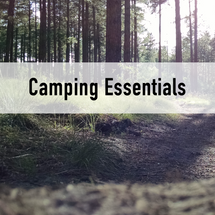Posted by Staff on 3rd Mar 2017
Must Have Camping Essentials
At StatGear, we’re all about preparation.
From having the necessary auto/survival kits when on the road, to a handy every day carry blade, or rescue tools in the event of an emergency, being prepared is a must in any situation. When it comes to camping, it’s easy to overlook some of the most important items - after all, you’re temporarily leaving behind the comforts of your home to live in the outdoors! When it comes to camping, there’s a multitude of things to consider and remember. By making a list, and considering the type of environment you’ll be camping in (mountains, forest, etc), you’ll have greater piece of mind when trekking out on your adventure!
First Aid Kit:
Cuts, scratches, burns - any one of these things is likely when you’re in the great outdoors. We carry both an auto first aid kit, and an auto survival kit. Both Kits feature all the necessary first aid items should you ever need them!
Rope:
The versatility of rope cannot be overlooked. Hanging your cooler (with food) at night from animals, a clothes line for wet clothes, or even for a temporary shelter, the simplicity of rope can assist in the most complex of situations.
Tarps:
Like rope, a tarp can be extremely versatile. They’re easy to fold and are great for protection. Caught in unexpected rain? Throw the tarp over your tent. If you’re really roughing it, throwing a tarp over your rope and securing each side at the bottom will give you a roof over your head. Tarps can also be great for keeping the base of your tent dry should the ground be wet.
Water:
Water is one of the most crucial items for camping. If your campsite doesn’t have a water source / supply, consider packing more than what you think you’d need. Remember you’ll need water for more than just drinking: Cooking, showering, cleaning wounds, etc. If you’re caught in a bind, but are able to find a water source like a pond, lake, or are able to collect rainwater, there are water bottles which can purify your water. Other options are water purification tablets, and purifying with bleach, and of course boiling your water to kill any bacteria.
Refer to this link for best practices and the steps for doing each:
http://www.doh.wa.gov/Emergencies/EmergencyPreparednessandResponse/Factsheets/WaterPurification
Portable stove:
Some campgrounds don’t allow for campfires. If this is the case, a portable stove is a must. There are a few different types of camping stoves: alcohol burning, wood and solid fuel, white gas or canister.
Alcohol:
A simple alcohol burning stove can consist of just a small metal cup holding burning alcohol. They emit far less soot and noxious vapors than other sorts of stoves. Many consider a disadvantage of alcohol stoves is that you have to bring more fuel, and your food cooks more slowly.
Wood burning:
Wood burning stoves can be a bit bulkier, but an upside is that they don’t require fuel. If carrying wood is too bulky or not an option, many can burn solid fuel pellets. Some of the disadvantages are experimenting to get the right temperature, and they spread soot and make everything that touches them smell like a campfire.
White gas stoves:
These types of stoves use a cartridge of pressurized white gas attached to a burner. The white gas produces a very hot and relatively clean burning flame. Simple white gas stoves can weight under 1 pound, not including the weight of the fuel tank. White gas stoves do require priming and pumping, and can be temperamental.
Canister stoves:
These types of stoves are a bit easier to operate than white gas stoves. In a canister stove, the burner sits directly on top of a canister containing liquid butane or propane. Pressure from the canister drives the fuel out of the burner directly without the need for priming. A downside to canister stoves is that they can lose power as the canister empties and the pressure drops.
Flashlight or lantern:
Whether you’re navigating back to your campsite while the sun is setting, or you get up at night to use the restroom, a flashlight or lantern is an essential component to your kit.
Matches:
Without a fire, you have limited options when it comes to food and warmth. A fire can also be a great way to signal for help in the event you get lost at night. Matches also have a long shelf life, so consider bulking up. Waterproof and strike anywhere matches are a good choice. Many flashlights made for camping have a compartment which hold matches, so consider storing some inside in addition to your kit or bug out bag.
Protein:
Bars, powder, beef jerky, peanut butter… Protein is an essential item when it comes to camping. If you’re the type that loves to hike, protein is a vital item to starve off hunger. Many protein options have a long shelf life, so bulk up and store!
Pocket Knife:
Last, but certainly not least, is a good pocket knife. Knives have a multitude of uses - aside to the blade, they’re good for protection, or like a Swiss Army Knife / multi-tool, you have a versatile all-in-one tool. Consider something like our Surviv-All Survival Knife which has a fire starter rod, a knife sharpener (in the rear sheath), and a belt attachment on the sheath. The Survival-All is a great camping knife because of it’s large blade, and fire-starter rod attachment.
This list was meant to focus on the “must have / need” for camping. Your list of necessities may be different than the next person’s, but by keeping these things in mind, you’ll be prepared in the event of emergency.
Happy Camping!

